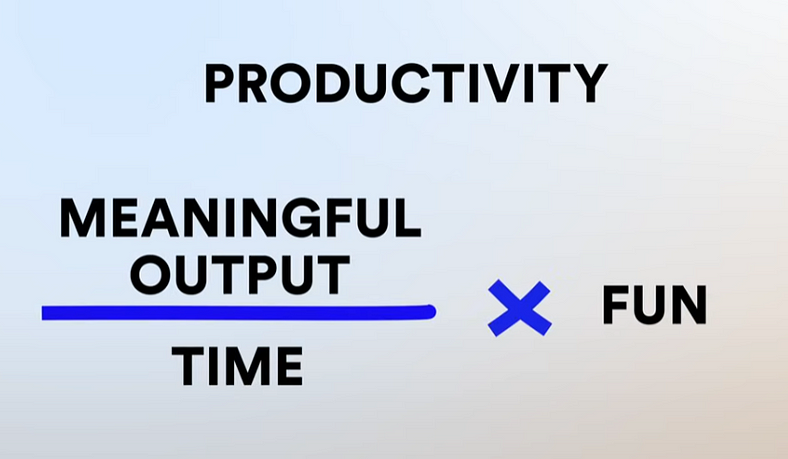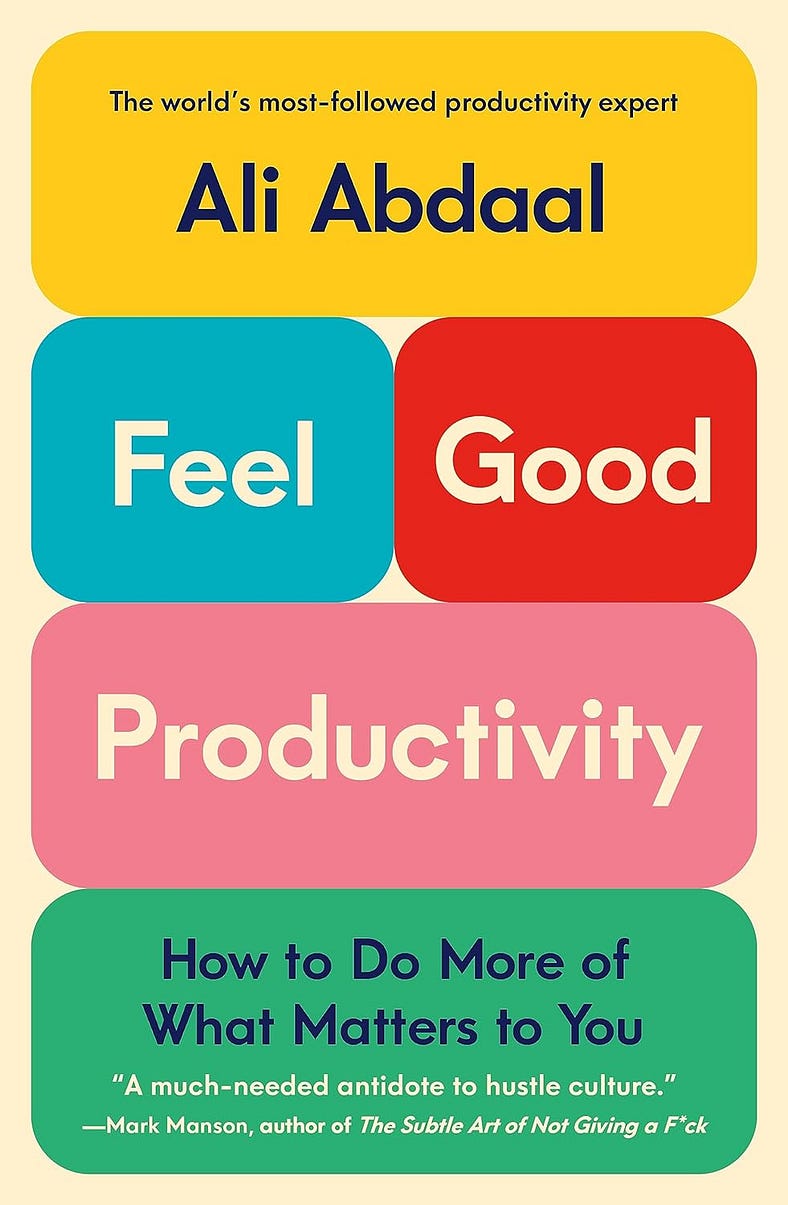Top 7 Myths That Are Ruining Your Productivity
If you’re reading this post, you’re probably looking for some way to gain an upper hand in life, some weapon or tool to help you become the best version of yourself.

If you’re reading this post, you’re probably looking for some way to gain an upper hand in life, some weapon or tool to help you become the best version of yourself.
However, it’s not always about a specific system you need to follow that will help you reach your goals; looking at what you shouldn’t do will also help you determine what you should do.
With that being said, here are 7 Productivity Myths from Productivity Expert Ali Abdaal that you MUST avoid if you want to reach your fullest potential:
When someone says, “I want to be more productive,” they’re usually inferring that they want to do more of something. Perhaps they feel like they didn’t study enough today or didn’t work on a personal project that’s due soon.
But productivity is more than just about “what” you do. Ali Abdaal outlines a powerful productivity equation we can use to demonstrate this concept:

Of course, time is an obvious factor. If I finished cleaning my room in 1 week when it could’ve taken me 1 hour, I wouldn’t call that being productive.
A lot, actually.
Being able to enjoy whatever it is that you want to do is an extremely powerful multiplier in getting it done because there’s no larger obstacle to completing a task than hating it. That’s why procrastination is such a prevalent issue. When you dread doing something, that forms an imaginary wall that prevents you from even starting it. This friction inevitably leads to procrastination.
The most sustainable way to consistently get things done is by learning to enjoy it.
I’m not saying that you have to love doing your taxes with a burning passion, but there are still ways to begin liking the journey. For example, I always play my favorite music when I’m working. Maybe rewarding yourself with a drink at a calm coffee shop is all you need to think, “Hey, this actually isn’t that bad!”
So instead of wondering:
Ask yourself the question: “How can I make this more enjoyable?”
Most people think that motivation leads to action; in other words, if I want to do anything, I need to feel motivated to do it. If anything, though, it’s the other way around:
Action leads to motivation.
You can still choose to do something even if you don’t feel like doing it. That’s simply called discipline. The more you do it, the more it develops into a habit in which you no longer feel like you need motivation to do it.
This also ties into what I talked about earlier. If you learn to enjoy the routine, you don’t need motivation to go through with it.
People tend to think that productivity and self-care are mutually exclusive, but there are times when productivity is self-care and self-care is productivity. Let me give two examples:
Both situations are healthy examples of self-care. By studying, I am helping my current and future self’s career, mental health, and well-being compared to if I did nothing and failed my exam. Furthermore, by taking a day to relax after my hard work, I am preventing burnout and boosting my mental health.
It’s also been shown that the happiest people are the healthiest ones, so by doing something productive like going to the gym, you are also participating in a form of self-care simultaneously.
One major reason is due to the habit of constantly beating themselves up over not feeling like they’re doing enough.
I am all too familiar with this feeling. The thoughts of “I could’ve done more if I didn’t get distracted on TikTok” or “Today wasn’t a productive day because I spent too much time watching Invincible.”
While what I’m saying is likely true, I can still choose to be satisfied with what I accomplished that day. Sure, if I watched one less episode of Invincible, I probably could’ve studied a little more or practiced one of my hobbies, but at the end of the day, that is out of your control. Instead, follow the Stoic teachings of only worrying about things you can control.
Be happy with what you accomplished today, so that you can look forward to having an even better day tomorrow.
Have you ever had to go somewhere in half an hour and thought to yourself, “I can’t really do anything in just half an hour.” As a result, you just go on YouTube or social media? This is a complete myth. Although half an hour is pretty short, you can still get good work done!
For instance, Micro-learning is the learning you do during short periods of time. If you only have 10 minutes but are able to learn 2–3 flashcards in those 10 minutes, you saved yourself time for when you study the rest later. These micro-learning sessions add up over time and boost your efficiency.
For example, Matthew Dicks, author of Someday is Today, was able to write over 10 books while balancing out the rest of his life simply by writing during short breaks during the day. His story shows us that these small periods of intentional use of your time can build up and have astronomical effects.
I get it. It’s so much nicer to study at your favorite spot. Whether it’s a boba shop, the library, or the comfort of your own room, all of us have our little sweet spot for getting stuff done. And that’s okay!
But it becomes not okay when this prevents you from getting work done at any other location under different circumstances. The truth is that you don’t need these conditions in order to work well. You can still choose to do work at a spot that is a little less favorable. Don’t fall into the trap of only being able to do work where it feels right for you.
So we finally get to my favorite myth of them all. The reason I saved this for last is because this is something I personally struggle with every day, and I know a lot of you guys probably struggle with too.
There are a lot of things we all want to do. For me, some things include:
The list goes on and on, which causes there to be times when I would think, “I want to do this, but do I really have enough time for it?”
At first, I would say that it’s reasonable to say that I don’t have enough time to do something. After all, I’m a busy pre-med student balancing 2 EMT jobs, full-time classes, and research. There’s no way I can become a content creator on top of that!
But then I would find myself mindlessly scrolling on TikTok for hours or playing video games with my friends until 5 AM. The truth is that 99% of us have the time to do what we want to do, but it simply isn’t enough of a priority.
Let’s say you want to learn an instrument, but it’s hard to balance that on top of school. However, if I gave you $1000 for every day you practiced an instrument, you would most definitely make the time to practice that skill. This shows that the reality is that you, in fact, do have enough time.
So the next time you are about to fall into the trap of “I don’t have enough time,” instead say:
“It’s not enough of a priority for me.”
Even though this is very similar to “I don’t have enough time,” this shift gives you a greater sense of autonomy in your life. Rather than letting life push you around, you are actively choosing to not do that thing. For me, on the other hand, this shift has helped me realize that I do actually want to make that thing a priority. By realizing I have full control over my time, I can then start working toward balancing my schedule in a way that I am able to pursue all of my different interests on top of my professional and academic lives.
That’s all I got for this blog post. Please let me know what your thoughts are in the comments!
Many of the concepts I described in this blog can also be found in Ali Abdaal’s Feel Good Productivity. He goes into great detail about this topic and many more. You can purchase a copy of his book here: https://amzn.to/486hTDI.
